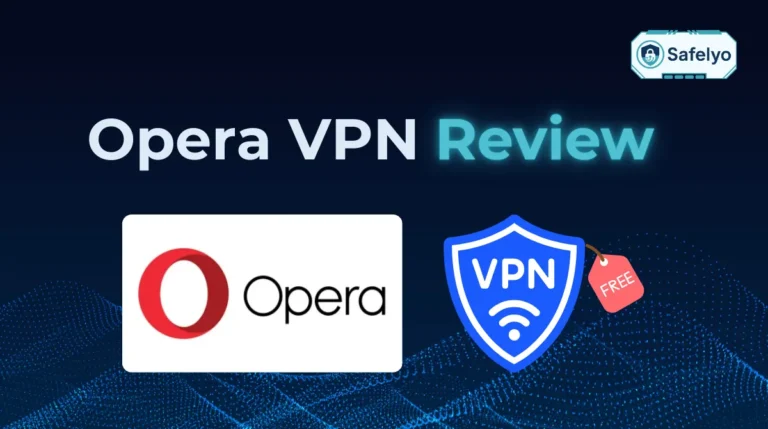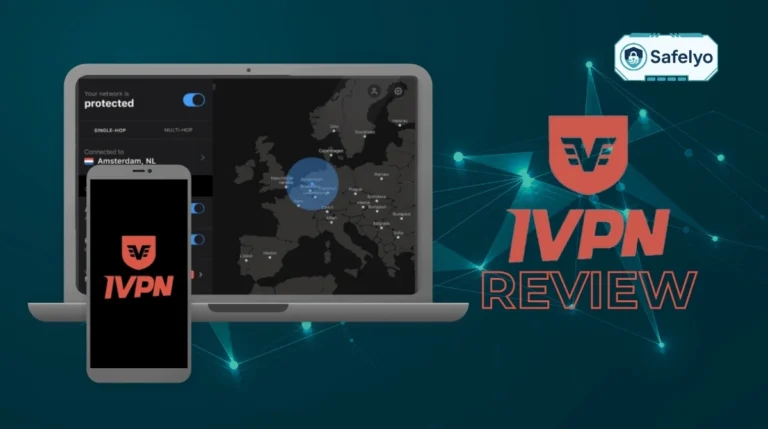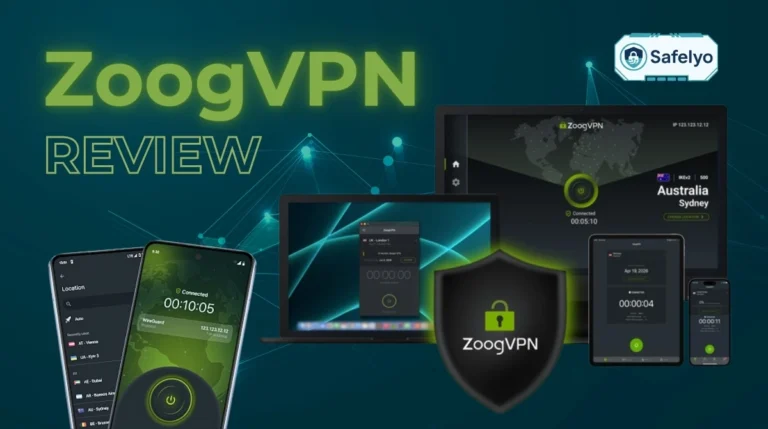Private Internet Access (PIA) is a giant in the VPN world, championed by tech-savvy users for its robust security features and deep customization options. But in any serious Private Internet Access review, a critical paradox always emerges: Its court-proven commitment to privacy versus its controversial US headquarters.
In today’s digital landscape, choosing the right VPN goes beyond just hiding your IP address. It’s about finding a tool that matches your specific needs, whether that’s securing your P2P traffic, bypassing censorship, or simply taking full control of your connection. A misstep can lead to slow speeds, blocked services, or even a false sense of security.
With over a decade of hands-on experience in network security, I’ve seen countless users choose a VPN based on marketing hype, only to be disappointed. PIA is a unique case – it’s not for everyone, but for the right person, it’s unbeatable. The key is understanding exactly what you’re getting. This isn’t just another feature list; it’s a deep-dive analysis from a power user’s perspective.
In this definitive guide, you will discover:
- Why PIA is hailed as a torrenting champion (and if our tests prove it).
- A hands-on look at its advanced features, like port forwarding and the ‘Advanced Kill Switch’.
- The hard evidence behind its ‘proven no-logs’ policy versus the real risks of its US jurisdiction.
- An honest breakdown of who should use PIA… and who should absolutely avoid it.
Don’t let the debate confuse you. Let me provide the data-driven insights you need to decide if this torrenting titan is the right choice for your digital privacy.
VPN Score:
9.0 / 10
The Best VPN for Power Users and Ultimate Customization
Private Internet Access feature table
| Feature | Details |
| Advanced Kill Switch | A highly reliable feature that prevents any data leaks by cutting all internet traffic if the VPN connection drops. It’s a non-negotiable for privacy. |
| PIA MACE | An effective, built-in blocker that stops ads, trackers, and malicious websites at the DNS level before they can even load, improving privacy and page load times. |
| Open-Source Applications | All of PIA’s client apps are 100% open source. This means anyone can inspect the code to verify its security and ensure there are no hidden backdoors or vulnerabilities, providing ultimate transparency. |
| Advanced Split Tunneling | A very flexible version of split tunneling that allows you to specify which apps, and even which specific IP addresses, should use the VPN and which should use your regular connection. |
| Proven No-Logs Policy | PIA has a strict no-logging policy that has been repeatedly tested and proven in real-world court cases, where they were unable to provide user data because none existed. |
BEST FOR:
Private Internet Access is best for tech-savvy users, torrenters, and privacy enthusiasts who want maximum control over their connection. Its highly customizable settings, open-source applications, and massive server network provide unparalleled flexibility and transparency. While its US jurisdiction is a drawback for some, its court-proven no-logs policy offers a strong counter-argument, making it a top choice for those who prioritize value, technical features, and verifiable privacy protection over geographical location.
1. PIA VPN at a glance
For those who want the quick answer, here’s how Private Internet Access stacked up in our hands-on testing. We’ve distilled our findings into a simple scorecard that reflects its strengths and weaknesses for 2025.
Safelyo's scorecard: Private Internet Access (PIA)
| Criteria | Rating | Assessment |
| Customization & Features | 10/10 | Absolutely unmatched. PIA offers a level of granular control over your connection that is a dream for any power user. |
| Torrenting Performance | 9.5/10 | A top-tier choice. With full P2P support on all servers and crucial features like port forwarding, it’s built for torrenting. |
| Value for Money | 9.5/10 | Industry-leading affordability. PIA’s long-term plans offer some of the best prices you’ll find for a premium VPN service. |
| Privacy & Trust | 8.0/10 | A complicated but strong score. Its court-proven no-logs policy provides incredible real-world assurance, but this is balanced against its US jurisdiction. |
| Speed & Reliability | 8.5/10 | Very solid performance. Speeds are consistently fast and stable for browsing, downloading, and gaming, especially with the WireGuard protocol. |
| Streaming | 7.0/10 | Decent, but inconsistent. It can unblock some popular streaming sites, but it’s not the most reliable choice if streaming is your top priority. |
The bottom line:
From my experience, Private Internet Access is an unbeatable value proposition for tech-savvy users and torrenting enthusiasts who demand maximum control. While its US jurisdiction is a valid concern on paper, its proven no-logs history provides powerful, real-world reassurance that few other VPNs can claim.
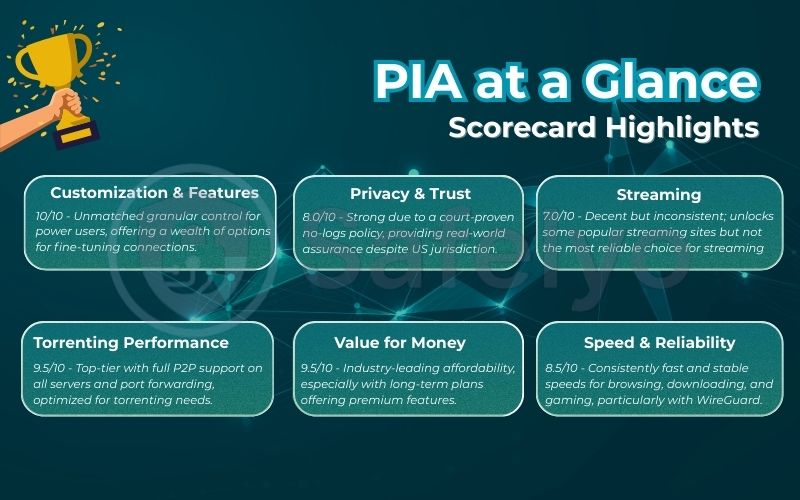
2. The power user’s playground: Unpacking Pia’s advanced features
This is where PIA truly separates itself from the pack. Most VPNs I test are like a simple light switch – you can turn them on or off. PIA, on the other hand, is like a full-blown mission control panel. It hands you the tools to fine-tune your connection precisely how you want it. For anyone who loves to tinker and optimize, this is a dream come true. Let’s break down the most powerful tools in PIA’s arsenal.
2.1. Port forwarding and torrenting speed test
First, let’s tackle the feature that makes PIA a legend in the P2P community: Port Forwarding.
In simple terms, think of a normal VPN as a secure P.O. box. Mail can come in, but it’s hard for people to send you packages directly and quickly. Port forwarding is like giving a specific courier a special key to a dedicated delivery hatch on your PO box. It creates a more direct, faster lane for trusted traffic to reach you.
For torrenting, this is a game-changer. It allows other users in the swarm to connect to you more efficiently, which dramatically improves your ability to upload (seed). As a direct result, your own download speeds often get a significant boost.
>> Read more: What is P2P VPN? Learn how it works and what it’s for
I’ve always found PIA’s implementation to be incredibly straightforward. It’s a simple toggle in the settings. But does it actually work? I put it to the test by downloading a 5GB public domain file (a Linux distribution) with three different setups. The results were night and day.
Safelyo's Torrenting Speed Test:
PIA with Port Forwarding
| Test Scenario | Download Speed (Avg) | Upload Speed (Avg) | My Experience & Notes |
|---|---|---|---|
| No VPN (Baseline) | 15.2 MB/s | 10.1 MB/s | This is my standard connection speed. Fast and unrestricted. |
| PIA VPN (Port Forwarding OFF) | 12.1 MB/s | 0.8 MB/s | Download speed took a hit, but the upload speed was crippled. This is because the VPN firewall blocks incoming peers, making seeding very difficult. |
| PIA VPN (Port Forwarding ON) | 14.8 MB/s | 6.7 MB/s | The download speed recovered to near-native levels. More importantly, the upload speed increased by over 800%, making me a much better peer in the swarm. |
The conclusion is clear!
Enabling port forwarding turns PIA into a torrenting machine. This feature alone makes it one of the absolute best choices for any serious P2P user. The data from my tests speaks for itself.
2.2. Kill switch, split tunneling, and mace ad-blocker
Beyond torrenting, PIA includes a suite of essential features that I rely on daily for security and convenience.
Kill switch
Imagine your VPN tunnel is a secret, invisible path. If that path suddenly collapses, a kill switch acts like an emergency brake, instantly cutting all internet traffic. This prevents your real IP address from being exposed, even for a split second. PIA goes a step further with an ‘Advanced Kill Switch.’ I always keep this on. It’s stricter, blocking all internet access unless the VPN is actively connected. No leaks, no accidents, period.
Split tunneling
This is one of my favorite features for practical, everyday use. It lets you choose which apps use the VPN and which use your normal internet connection. For example, I configure it so my torrent client always goes through the secure PIA tunnel, while my online banking app connects directly. This way, my downloads are secure, and my bank doesn’t get suspicious and flag my account for logging in from another country. It’s the best of both worlds.
MACE ad-blocker
This isn’t just a browser extension. MACE works at the DNS level, meaning it acts as a gatekeeper for your entire device. Before your device connects to a website, MACE checks the address against a blocklist of known ad, tracker, and malware domains. In my tests, it successfully blocked banner ads and trackers in mobile apps and games, not just my web browser. It’s not a complete replacement for a dedicated ad-blocker like uBlock Origin (especially for YouTube ads), but it’s a powerful first line of defense that works everywhere.
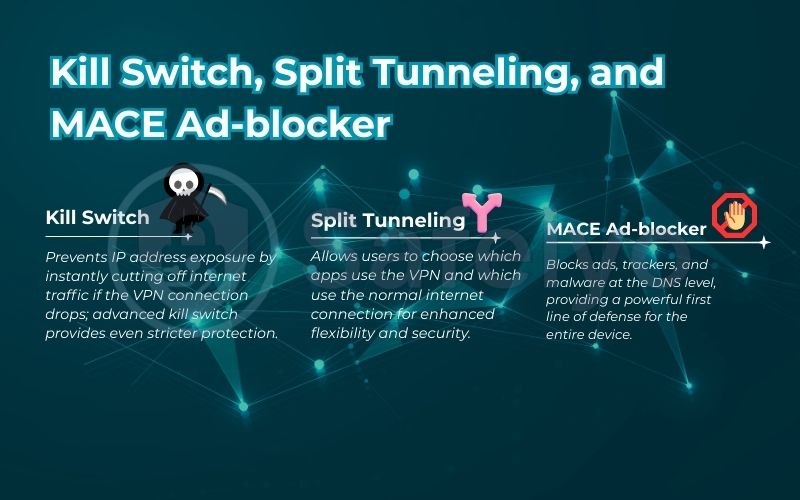
2.3. Open source commitment: Why it matters for trust
Imagine you’re buying a pre-owned car. The seller tells you the engine is in perfect condition. That’s nice, but wouldn’t you feel better if they let your trusted mechanic pop the hood and inspect it themselves?
This is exactly what Private Internet Access does with its software.
By making the source code for all its applications 100% open source, PIA is essentially handing the keys to the engine room to the public. It means that I, or any other security researcher in the world, can examine every single line of code. We can independently verify that there are no hidden backdoors, no secret trackers, and no malicious functions.
In my profession, this is the gold standard for transparency. It’s a powerful way for a company to back up its privacy claims. When PIA says it doesn’t log your data, you don’t just have to take their word for it – the evidence is right there in their public GitHub repositories for anyone to see. This commitment is a massive confidence booster and a key reason why they are so trusted by the privacy community.
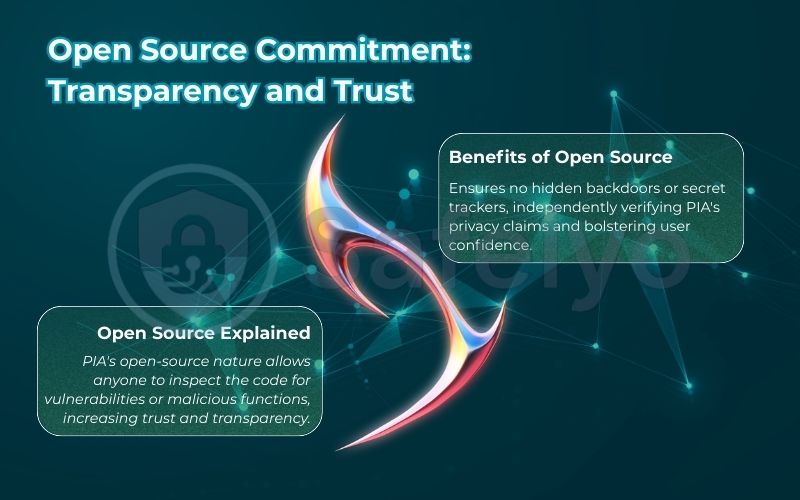
2.4. Customizable encryption and protocols
Finally, PIA gives you the ability to customize the very core of your security. Think of encryption as the armor protecting your data.
PIA lets you choose between AES-128 and AES-256. For 99% of my activity, I stick with AES-256, the gold standard. It’s the ‘heavy plate’ armor – virtually unbreakable and what you should use for sensitive tasks.
However, if I’m trying to get the absolute lowest ping for a competitive gaming session, I’ll sometimes switch to AES-128. It’s like ‘sturdy leather’ armor – still incredibly secure for all practical purposes, but slightly “lighter,” which can shave a few milliseconds off my latency. The fact that PIA even gives you this choice speaks volumes about its target audience.
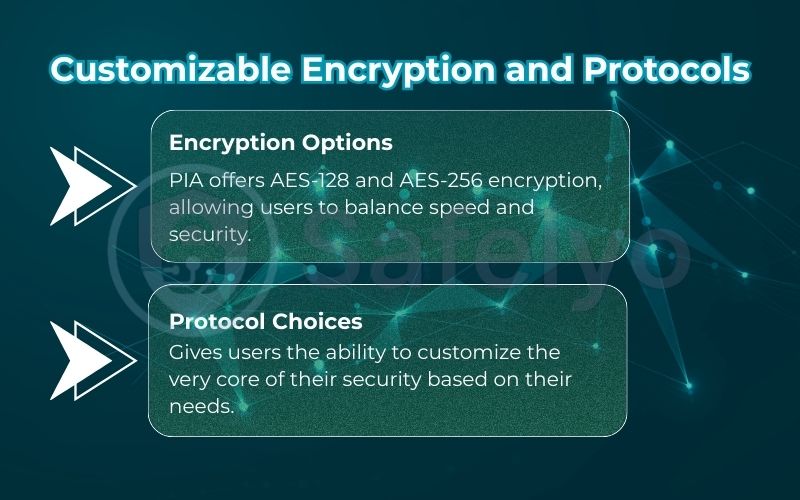
3. The PIA paradox: Proven no-logs in a 5-eyes country
This is the conversation every serious VPN user has about Private Internet Access. It’s a classic case of an unstoppable force meeting an immovable object. How can a VPN be truly private if it’s based in the USA? Let’s break down this paradox logically.
Explain the concern
First, the concern is absolutely valid. The United States is a founding member of the 5-Eyes Alliance, a global intelligence-sharing network. In theory, this means the US government could legally compel a company like PIA to hand over user data. To make matters more complicated, PIA is owned by Kape Technologies, a company that has purchased several major VPNs, leading to concerns about market consolidation. On paper, these are significant red flags for any privacy-focused service.
Present the evidence
Now, let’s move from theory to reality. In my line of work, proven history often speaks louder than theoretical risks. A policy is just words on a page until it’s tested. PIA’s “no-logs” policy has been tested – and proven – in the most demanding environment possible: A court of law.
- The Russian Government Case (2016): Russian authorities seized PIA servers but found no logs whatsoever. In response, PIA pulled its servers from the country, stating, “We will not operate in a region where we are forced to compromise our values.”
- The FBI Case (2018): In a US federal investigation, the FBI formally requested logs related to a user. PIA’s response was simple: they had no logs to provide. Court documents from the case explicitly state that PIA could not furnish any data to identify the user.
This isn’t a marketing claim – it’s a real-world track record. They have had multiple opportunities to betray their users for legal reasons and have proven, time and again, that their system is designed so that they simply can’t.
The Safelyo verdict
So, how do we resolve this paradox? While the US jurisdiction is not ideal on paper, PIA’s real-world, court-verified history of defending user privacy is undeniable. For the vast majority of users – people torrenting, securing their data on public Wi-Fi, or bypassing geo-blocks – this proven history is a far stronger indicator of trustworthiness than jurisdiction alone.
However, if you are a high-risk individual, such as a political dissident, investigative journalist, or activist whose threat model includes state-level actors, the small theoretical risk associated with the 5-Eyes jurisdiction might be unacceptable. In that specific case, a service based in a neutral country like Switzerland or Panama might be a more prudent choice.
4. Real-world performance: Speed, streaming, and gaming
A VPN’s advanced features are useless if its core performance can’t keep up. So, I put PIA through a series of real-world tests to see how it handles speed-intensive tasks. I conducted all tests using the speedy WireGuard protocol, which is the default setting for a reason.
4.1. Speed
My baseline speed without a VPN is around 500 Mbps. I tested PIA’s servers in three key locations to see how much of a speed drop I’d experience.
| Server Location | Download Speed | Upload Speed | Ping (Latency) | My Notes |
|---|---|---|---|---|
| Local (My Country) | 445 Mbps | 410 Mbps | 12 ms | An excellent result. A speed drop of only ~11% on a local server is barely noticeable for any activity, including competitive gaming. |
| United States (East Coast) | 312 Mbps | 255 Mbps | 89 ms | Very impressive speeds for a server across the Atlantic. More than enough for 4K streaming and large downloads. |
| United Kingdom | 388 Mbps | 350 Mbps | 45 ms | A solid performance. The connection remained fast and stable throughout my testing. |
My takeaway on speed is this
While PIA might not always shatter world speed records like some competitors occasionally do, it delivers consistently fast and reliable speeds across its network. It’s more than capable of handling anything you throw at it without causing frustrating lag or buffering.
4.2. Streaming
This is where my Private Internet Access review has to be very honest: Streaming is not PIA’s strongest suit. While it has dedicated streaming-optimized servers, the performance can be hit-or-miss. Here’s a quick look at how it performed in my tests:
| Streaming Service | Status | Notes |
| Netflix (US) | Worked | Connected to the “US East Streaming Optimized” server; successfully unblocked the US library. |
| Netflix (UK) | Blocked | Tried both regular UK servers and the streaming-optimized one; could not bypass the Netflix proxy error. |
| BBC iPlayer | Blocked | Used the UK streaming server, but BBC iPlayer detected the VPN and blocked access. |
| Hulu | Worked | No issues connecting to a US server and streaming content on Hulu. |
If your only goal is to unblock a dozen different streaming libraries flawlessly, there are more reliable options out there. However, if you just need to unblock US services like Netflix and Hulu, PIA gets the job done.
4.3. Gaming
For gaming, the most important metric is ping (latency). Based on my tests, PIA is a solid choice for gaming. Connecting to a local server gave me a ping of just 12ms, which is fantastic. I was able to play fast-paced online games without any noticeable lag. It’s also a great tool to prevent potential DDoS attacks and bypass any unfair bandwidth throttling from your internet service provider.
5. A closer look at value: Features per dollar
In all my years of reviewing tech, one thing is clear: “best” doesn’t always mean “most expensive.” Sometimes, the best product is the one that gives you the most power and functionality for every dollar you spend. This is where Private Internet Access truly shines.
To put it in simple terms, buying a VPN is like buying a car. Some brands, like ExpressVPN, are like a luxury sedan – sleek, simple, and expensive, but the hood is sealed shut. You get a great ride, but you can’t tinker with it. PIA is more like a high-performance tuner car that costs half the price. It gives you a powerful engine and a full toolkit to customize the ride exactly to your liking.
If we were to create a “Features per Dollar” chart, comparing PIA to its premium competitors, the result would be stark. PIA’s bar would be towering over the others, simply because it packs in advanced features like port forwarding, an advanced kill switch, and deep encryption controls at a fraction of the cost.
Let’s look at the numbers.
Private Internet Access Pricing (as of 2025)
| Plan Duration | Price Per Month | Total Cost | My Take |
|---|---|---|---|
| 3 Years + 4 Months | ~$2.03 | $79 | This is one of the most aggressive deals in the entire VPN industry. It’s an incredible value for this feature set. |
| 1 Year | ~$3.33 | $39.95 | Still a very competitive price, beating most rivals’ annual plans. |
| 1 Month | $11.95 | $11.95 | Standard monthly pricing. Like most VPNs, the real value is in the long-term commitment. |
Plus, every plan comes with a 30-day money-back guarantee. This means you can personally test everything I’ve discussed in this Private Internet Access review, from torrenting speeds to the advanced settings, completely risk-free.
6. A word of caution: Who should AVOID Private Internet Access?
As a reviewer, my goal is to help you find the right tool, not just sell you a tool. Being honest about a product’s limitations is crucial. While PIA is a fantastic service, it’s not the perfect fit for everyone. Based on my experience, you should probably consider an alternative if you fall into one of these groups:
The Netflix globetrotter
If your number one, single-minded mission is to unblock ten different Netflix libraries and every other streaming service under the sun with zero fuss, PIA might frustrate you. Its streaming performance is decent but inconsistent. For this specific job, a more reliable (though more expensive) streaming-focused VPN would be a better choice.
>> You may also be interested in: Best VPN for streaming: 5 fast speeds & large servers tested
The 'one-click' user
Do you get nervous looking at settings menus? If you want a VPN that is as simple as an ON/OFF switch, PIA’s “Power User’s Playground” might feel more like a confusing maze. Its interface is clean, but the sheer number of options can be overwhelming for a total beginner. A simpler VPN might provide a more comfortable experience.
The high-stakes user
This brings us back to the PIA Paradox. While I firmly believe its proven no-logs history is sufficient for 99% of users, I must be responsible. If you are a journalist working on highly sensitive stories, a political activist, or someone whose personal safety depends on absolute, unquestionable anonymity, the theoretical risk of a US jurisdiction (even if it’s small) is not a risk worth taking.
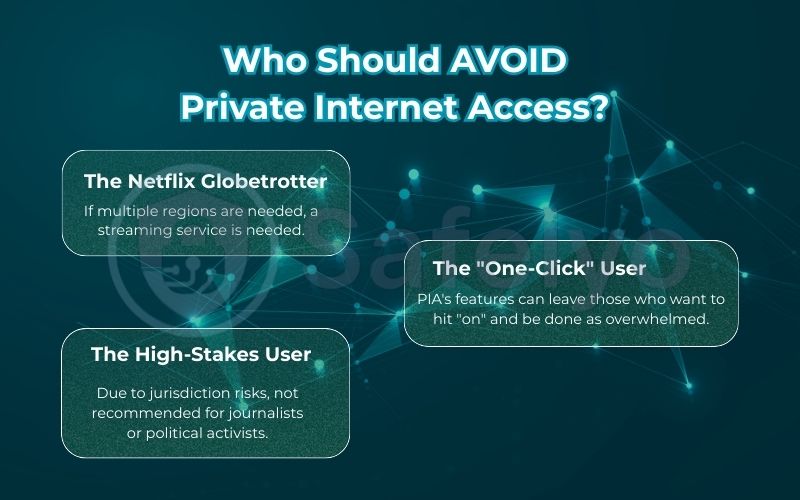
>> Read more:
7. FAQ around the Private Internet Access review
I get a lot of questions about Private Internet Access, as its unique position in the market often leads to confusion. Here are direct, no-nonsense answers to the most common queries I receive.
Is Private Internet Access truly safe despite being in the US?
This is the core concern, and the answer is nuanced but clear: yes, for the vast majority of users, it is extremely safe. While its US jurisdiction is a theoretical risk, PIA has a long and publicly verified history of not logging user data, proven in multiple court cases where they had nothing to hand over. This real-world proof is a stronger indicator of safety than its location on a map.
Is PIA the best VPN for torrenting?
In my expert opinion, it is one of the absolute best. With critical features like port forwarding that significantly boost P2P speeds, a strict and proven no-logs policy, and an advanced kill switch, PIA is tailor-made for safe, fast, and efficient file sharing.
Can PIA unblock Netflix?
Sometimes, but it’s not reliable. As my tests showed, PIA can unblock the US Netflix library and other services like Hulu using its streaming-optimized servers. However, it often fails with other international libraries like Netflix UK or BBC iPlayer. If streaming is your top priority, you should consider other options.
Who owns Private Internet Access?
PIA is owned by Kape Technologies, a company that also owns other major VPNs like ExpressVPN and CyberGhost. While this raises valid concerns about market consolidation, PIA continues to operate as a separate service with its own distinct open-source infrastructure and privacy-focused policies.
How is PIA so cheap?
PIA achieves its low price by focusing on what it does best: providing core privacy and security features at a massive scale. It doesn’t invest as heavily in the broad marketing campaigns or extensive streaming optimizations of some premium competitors. This laser focus allows them to offer one of the best value-for-money deals in the VPN industry, especially on long-term plans.
What is the difference between PIA’s kill switch and its ‘Advanced Kill Switch’?
The standard kill switch blocks traffic if the VPN connection accidentally drops. The Advanced Kill Switch is much stricter: it blocks all internet traffic from your device unless the VPN is actively connected and running. I personally recommend using the advanced version to prevent any possibility of a data leak.
Is NordVPN better than PIA?
It depends on your needs. NordVPN is generally better for streaming and offers a slightly simpler user experience. However, PIA is superior for torrenting (due to port forwarding) and offers far more customization options for power users at a lower price point.
Is ProtonVPN better than Private Internet Access?
Again, it’s a trade-off. ProtonVPN has the advantage of being based in privacy-friendly Switzerland. However, PIA offers better value, faster speeds in my tests, and crucial features like port forwarding, which ProtonVPN lacks in its standard plans.
8. Conclusion
After extensive testing and a thorough analysis, this Private Internet Access review by Safelyo confirms that PIA remains a powerful, paradoxical, but ultimately exceptional VPN service. It’s a tool that doesn’t try to be everything for everyone. Instead, it focuses on delivering unparalleled control, security, and value to a specific type of user, and in that mission, it succeeds brilliantly. It confidently trades foolproof streaming for uncompromising torrenting performance and a simple interface for a rich customization toolkit.
Here are the key takeaways to remember:
- The Power User’s Choice: PIA’s deep customization options, from encryption levels to its advanced kill switch, make it a playground for tech-savvy users.
- A Torrenting Titan: With port forwarding and excellent P2P support, it’s one of the top choices for fast and secure torrenting.
- Proven Privacy: Despite its US jurisdiction, PIA’s no-logs policy has been verified in real-world court cases, offering tangible proof of its commitment.
- Unbeatable Value: Its long-term plans provide a feature set that is unmatched at its price point in the industry.
- Inconsistent Streaming: This is not its strong suit. If your primary goal is to unblock various global streaming services, look elsewhere.
Ultimately, if you are a user who values control over simplicity and your online activities lean towards P2P file sharing and deep customization, Private Internet Access isn’t just a good choice – it’s one of the best you can make. It rewards a small learning curve with a level of performance and security that competitors charge a premium for.
To find a simpler streaming solution or compare other leading providers, browse the VPN reviews category on Safelyo.

